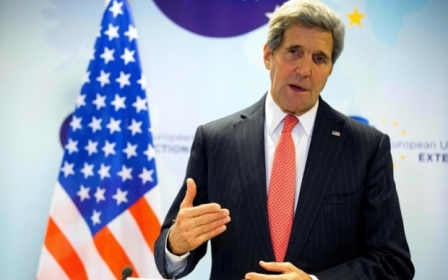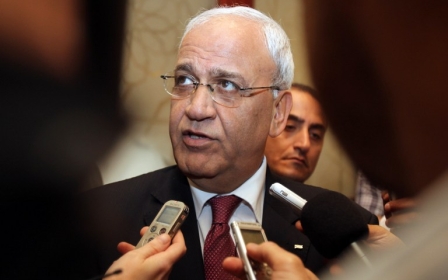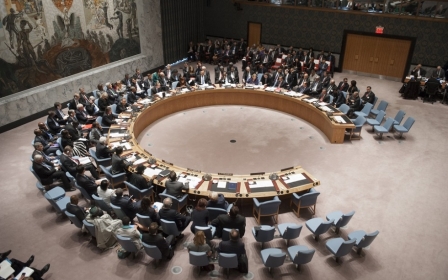EU court removes Hamas from terror list

The EU said Wednesday it still considers Hamas to be a "terrorist" group even though a European court ruled that it should be removed from the bloc's terrorism blacklist.
"The EU continues to consider Hamas a terrorist organisation," European Commission spokeswoman Maja Kocijancic said, adding that the EU would consider its response to the court's ruling, including the possibility of an appeal.
Earlier on Wednesday, the EU General Court removed the group from its list of designated terrorist organisation, arguing that it had been designated as a terrorist group not because of an examination of its actions but on "factual imputations derived from the press and the internet".
However, the court said the decision does not "not imply any substantive assessment of the question of the classification of Hamas as a terrorist group".
A freeze on the group's assets will remain in place for three months, during which time EU officials will the have the opportunity to appeal the decision.
The lawyer for Hamas, Liliane Glock, told AFP she was "satisfied with the decision".
"Every decision since 2001 imposing restrictive measures, including on the armed wing, have been annulled. I believe that this judgement shows the whole world that it exists and is legal," Glock said.
Israeli Prime Minister Benjamin Netanyahu responded angrily to the ruling and vowed to fight Hamas “with strength and determination”.
“We are not satisfied with the EU’s explanation that the removal of Hamas from its list of terrorist organisations is a ‘technical matter’,” said a statement by his office posted to Facebook.
“The burden of proof is on the EU and we expect it to put Hamas back on the list forthwith given that it is understood by all that Hamas – a murderous terrorist organisation, the covenant of which specifies the destruction of Israel as its goal – is an inseparable part of the list.”
In 2003, the EU declared the entire group of Hamas – including its social and political branches – as terrorists, after the organisation carried out a string of deadly suicide attacks in Israel.
The court’s decision answered a 2010 legal challenge by Hamas that argued the terrorist designation had not followed due process and violated human rights law as the organisation is “a legitimate elected government” in the Palestinian territories.
Hamas won a majority of seats in the 2006 Palestinian legislative elections, the last to be held in the occupied territories. When a deal for power-sharing between Hamas and Fatah failed to materialise after the election results, fighting broke out between the factions and ultimately saw a split in the Palestinian Authority (PA).
Hamas de facto came to rule the Gaza Strip and Fatah maintained control over the West Bank-based PA. A unity government agreed earlier this year, ending the seven year dispute, has been shaken by renewed infighting between Hamas and Fatah but remains in place for now.
Speaking before the court published its decision, Hamas spokesperson Sami Abu Zuhri responded said his organisation “looks forward to seeing the EU removing it from the terror list to correct the political mistake committed by the decision to include it".
“The inclusion of Hamas in the terror list was a big mistake that was unfair for the Palestinian people,” he told Anadolu Agency (AA). “Hamas is a Palestinian resistance movement and its activity is limited to resisting the [Israeli] occupation, which is a right enshrined in all international laws.”
Analysts said the court decision has been made on “procedural grounds”, pointing to another recent ruling that saw Sri Lankan separatist group the Liberation Tigers of Tamil Eelam (LTTE) removed from the terrorist list.
“The court emphasised [in the LTTE case] that the annulment of the terror designation was ‘on fundamental procedural grounds and does not imply any substantive assessment of the question of the classification of the LTTE as a terrorist group […]. A similar caveat is expected to accompany the Hamas annulment,” Matthew Levitt, a fellow at the US-based Washington Institute for Near East Policy, wrote on Tuesday.
Elsewhere on Wednesday, the Palestinian UN delegation is expected to submit a resolution the Security Council calling for the withdrawal of Israeli troops from the occupied territories within two years.
Chief negotiator Saeb Erekat has warned that if the US veto the resolution – as is expected – the Palestinians would seek to join all international organisations and conventions, including the International Criminal Court.
New MEE newsletter: Jerusalem Dispatch
Sign up to get the latest insights and analysis on Israel-Palestine, alongside Turkey Unpacked and other MEE newsletters
Middle East Eye delivers independent and unrivalled coverage and analysis of the Middle East, North Africa and beyond. To learn more about republishing this content and the associated fees, please fill out this form. More about MEE can be found here.




